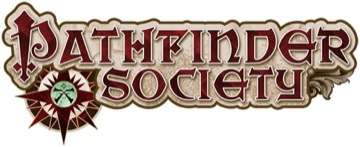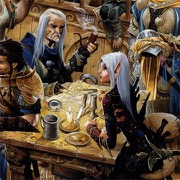Pathfinder Society 2: Factions and Fame
Wednesday, November 28, 2018
This is our fourth installment discussing our original sticky forum threads regarding the transition of the Pathfinder Society between version 1 and 2 of the Pathfinder Roleplaying Game. In past blogs, we discussed Tiers, Level Gain, and the Roleplaying Guild Guide; Boons and Chronicle Sheets; and GM stars, Replay, and Boon Conversion. We also put up a blog about Pregenerated Characters. We're seeking your feedback on each of these topics. If you're interested in sharing your thoughts and haven't done so already, please follow the links above.
Today, I'll be talking about the final thread, Factions and Fame. Who are your allies, and how can you leverage your reputation into meaningful benefits for your character? I'll talk about fame first, since it's a bit more straightforward.
Fame
There wasn't much discussion in the sticky thread about fame, so our work on this topic is mostly based off of the lessons we've learned from Starfinder Society. By a large margin, we've heard that people prefer just about every aspect of the way Reputation and Fame work in Starfinder Society to the way Fame and Prestige work in Pathfinder Society. I'll say more on the inconsistent definition of Fame across campaigns in a moment. But for now, I'd like to break down which changes we're looking to make for Pathfinder Society as we transition to the future..
Item Access: In the current version of Pathfinder Society, character's Fame determines their access to magic items. In theory, this system could be used as a way to reward PCs who excel at their missions with better item access. In practice, the chart is irrelevant to the vast majority of PCs, who are limited only by the amount of money they have. This system requires us to print magic items on Chronicle sheets that nearly all PCs would have access to anyway. We've heard a fair amount of negative feedback about this chart, and we're not planning to use it going forward. Instead, we are looking to tie magic item access to character level. This would not necessarily use the same rules as Starfinder Society. Once the new rules are finished, we'll explore the details of this method further. Factors like the rarity system and expected item access by level need to be finalized before we can realistically make progress on this topic.
What is my Prestige good for?: Other than removing the Fame chart for item access, the other common request we've received about the fame/prestige system is to make sure there are plenty of options for spending Prestige Points, with a focus on options that are broadly available to characters without being gated behind purchasing certain books or playing certain scenarios. For this, we're looking toward a model similar to Starfinder Society, including plenty of faction-specific boons as well as some general use boons. This would also come with a loosening of the faction system so PCs could earn benefits for multiple factions, but I'll get back to that in just a minute.
Infamy: Starfinder Society has an Infamy system, in which characters who choose particularly shady solutions to the challenges in the adventure or otherwise act in less-than-upstanding ways become known for their misdeeds. In Starfinder Society, infamous characters have a harder time finding people to sell them items. If they become infamous enough and don't take steps to fix their reputation, they could even lose their position in the Starfinder Society. The Infamy system has been particularly well-received, so we are planning to implement an Infamy system. We may tie Infamy to item access in the next iteration of the Pathfinder Society as well, but like I said above, decisions on that will need to wait until all of the changes from the Playtest are in place.
Fame and Prestige, or Reputation and Fame?: One point of confusion that arises between the Pathfinder Society campaign and the Starfinder Society campaign is the meaning of Fame. In Pathfinder Society, Fame is a number that represents your character's overall standing and influence, while Prestige Points are a spendable resource. In Starfinder Society, on the other hand, Reputation represents your character's standing and influence, while Fame is a spendable resource. We've received a fair amount of feedback that this is confusing. To make it easier for players to engage with both campaigns, we're inclined to use the terms Reputation and Fame in Pathfinder Society version two, in a matter consistent with the way they are used in Starfinder Society.
Factions
Factions have gone through quite a bit of transformation since the Season 0 of the Pathfinder Society Roleplaying Guild, when five rival factions based around the interests of specific nations vied for influence within the Society. In Season 3, the number of factions doubled, adding five more factions based more on ideology than national origin. In Season 4, in an attempt to bring the number of factions to a more manageable level, the two factions with the lowest reported popularity, the Lantern Lodge and the Shadow Lodge, were retired from play. In Season 6, the national factions themselves transformed into ideological ones. While these new ideological factions were better suited to storytelling and appealed to a broader range of characters, we received feedback that the mid-campaign switch was jarring. Faction transformations can be tough, and retirements more so, particularly if you've built a character around being part of a group and suddenly find yourself needing to switch to a different cause. With that in mind, we're working to build a system from the get-go that includes enough factions to give choice without being overwhelming, and to create factions that appeal to a broad range of characters without being generic.
One Faction or Many?: As members of the Pathfinder Society chapter one, PCs choose a single faction to represent. They can change to another faction, but doing so often requires paying a significant cost. In Starfinder Society, PCs can support the interests of a single faction, or they can branch out and champion several factions. They can choose each scenario which faction they want to champion, and there is no penalty for switching. The feedback we've received strongly suggests that the Starfinder system is a big improvement, so we're planning to use it in Pathfinder Society as well. This doesn't mean we're going to create Pathfinder analogues of the existing Starfinder factions, but rather that we want to open up more options for ways to play your character.
Scrolls, Spells, and Swords: We saw a few suggestions to include the schools within the Pathfinder Society—the Scrolls, Spells, and Swords—into factions. We aren't planning to make them factions; instead, we'd like them to represent another meaningful decision you can make at character creation. For context, most agents begin their careers by training at the Grand Lodge, receiving instruction from the three deans, adopting their respective virtues, and often favoring one of the three schools by the point of Confirmation. The Scrolls value knowledge, diplomacy, and the pursuit of truth. Meanwhile, the Spells value determination, independence, and magical talent. They focus on magical studies, both those that uncover the lost secrets of the past and those that create new items, spells, and traditions. Finally, the Swords value personal fitness, martial training, and sound judgment under pressure. In the future, we're planning to make this affiliation matter. We've begun to consider several models for giving the PCs access to resources and support based on their school (or what it might mean to be a field-commissioned agent), but this is another factor that will need to wait for the final game rules to consider further.
Factions: If the Scrolls, Spells, and Swords represent how your character joined the society and grew to become a capable agent, factions represent your character's goals, motivations, and allies. The shift from a rigid system of factions that demand exclusive allegiance to a system with many choices also gives us a chance to re-examine what the factions are.
What we aren't looking to do is simply port over factions into Pathfinder Society chapter two. Some factions have largely completed their goals. Others may experience changes over the course of Season 10 or during the campaign's Interactive Finale. Rather than being bound to the list of factions we have now, we'd like to start from the perspective of creating a list of factions that are interesting to many different PCs. To that end, we brainstormed a list of character motivations that lend themselves to group action. Some of these ideas have clear parallels to existing Pathfinder Society factions, while others explore new territory. Once we've chosen which seeds to use, we can build more nuanced factions around them. Let us know what you think in this week's survey, linked at the bottom of this blog.
So this raises a natural question—what about our faction leaders? Will they end up leading some of the new factions, taking supporting roles, fading into the background, or leaving the Society entirely? There's a Season 10 scenario that addresses exactly this question for one faction leader. Beyond that, we'd like to hear what you'd like to see us do with the current leaders. When rating NPCs, be sure to rate them based on your feelings as a player, not your character's feelings. So if there's an NPC that one of your characters has a grudge with, but that you as a player would like to see stick around, rate them accordingly.
We look forward to hearing your feedback in the Pathfinder Society Factions Survey!
Linda Zayas-Palmer
Developer
We have updated our Privacy Policy.
Paizo.com uses cookies. You can block paizo.com from using cookies within your browser settings, but doing so will hinder site functionality.
More information can be found in our Privacy Policy.

